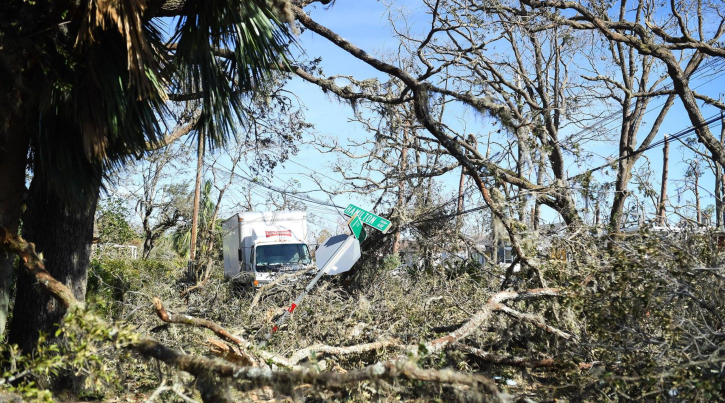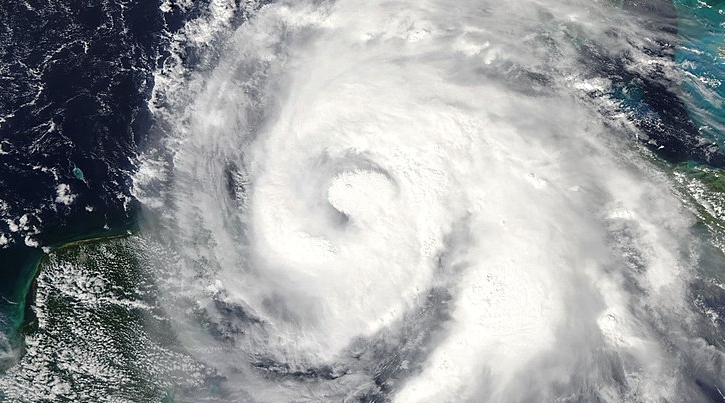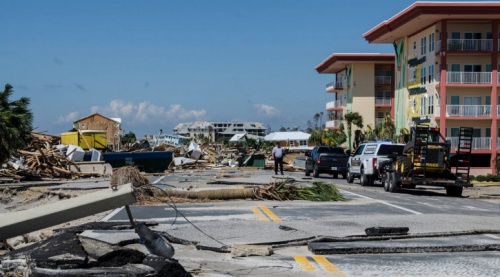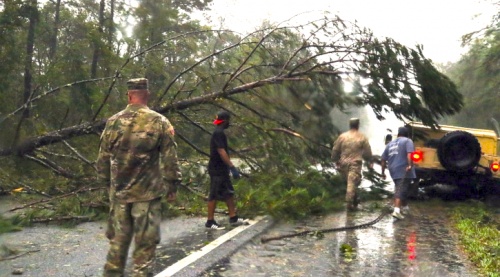Responding to Hurricane Michael

Press Release
October 17, 2018
Episcopal Relief & Development Provides Emergency Assistance after Hurricane Michael
Episcopal Relief & Development is working with affected Episcopal dioceses to provide critical support for local communities impacted by Hurricane Michael.
Through partnerships with the Episcopal Diocese of Georgia and the Episcopal Diocese of the Central Gulf Coast, the organization is providing emergency assistance to individuals and families affected by the storm, including food, shelter, generators and other basic supplies.
Hurricane Michael made landfall as a Category 4 storm on Wednesday, October 10, devastating areas of the Florida Panhandle and Georgia. The storm is responsible for at least 19 deaths in four states and destroyed homes and valuable infrastructure, particularly in Florida and Georgia. Over 140,000 Florida residents remained without power on Tuesday morning.
Episcopal Relief & Development’s US Disaster team has conducted daily coordination calls with leaders from dioceses impacted by Hurricane Michael since last week to support their efforts to provide relief to affected communities. The team will meeting with clergy from affected dioceses to help them assess needs and mobilize to respond to the most vulnerable communities.
Decatur County in Georgia was one area particularly hard hit. Albany, GA is without potable water, although power has been restored in many areas. Surrounding areas report downed power lines and damage to buildings and homes. The Diocese of Georgia is working to supply water purifiers to provide drinking water. The church is also responding with shelter, food and other supplies.
The Diocese of the Central Gulf Coast reports that Hurricane Michael caused damage affecting communities from Highway 331 to the Apalachicola River in Florida and from the coast to the Alabama state line. High winds and heavy rains knocked down power lines and trees, damaging at least 10 churches and schools as well as the communities surrounding them. The diocese is providing generators and gas to address power outages as well as cleaning supplies.
“I am encouraged to see how our local diocesan partners have mobilized in response to this devastating hurricane,” said Katie Mears, Senior Director of Episcopal Relief & Development’s US Disaster Program. “They are deeply embedded in their communities, helping people access other networks and resources.”
The Rt. Rev. Russell Kendrick and the Diocese of the Central Gulf Coast have invited Mears to visit the affected areas in Florida this week to see the impact firsthand and plan how Episcopal Relief & Development can support ministry in the coming weeks and months.
Please continue to pray for those impacted by Hurricane Michael. Donations to the Hurricane Relief Fund will help Episcopal Relief & Development respond to this crisis. To circulate the most recent bulletin inserts, click here.
For over 75 years, Episcopal Relief & Development has been working together with supporters and partners for lasting change around the world. Each year the organization facilitates healthier, more fulfilling lives for more than 3 million people struggling with hunger, poverty, disaster and disease. Inspired by Jesus’ words in Matthew 25, Episcopal Relief & Development leverages the expertise and resources of Anglican and other partners to deliver measurable and sustainable change in three signature program areas: Women, Children and Climate.
Photo: Stephanie Fisher Photography
Web Statement
October 12, 2018
Assessing and Responding to Hurricane Michael
Episcopal Relief & Development continues to support partner churches and dioceses as they assess the damage and impact of Hurricane Michael.
The Episcopal Relief & Development US Disaster team met again today with dioceses impacted by Hurricane Michael, the strongest hurricane to hit the Florida Panhandle in recorded history. Diocesan leaders are continuing to assess the destruction caused by this storm that hit earlier this week and to serve those affected. Episcopal Relief & Development will continue these coordination calls next week.
“From Highway 79 to the eastern edge of our diocese, the road conditions are still not safe for anyone to travel,” said The Rt. Rev. Russell Kendrick, diocesan bishop of the Episcopal Diocese of the Central Gulf Coast in a video posted on Thursday. “Please be patient. Let’s let the trained responders do their jobs and make the conditions safe so we can get in there and help as necessary.”
Bishop Kendrick and other diocesan staff are driving to Panama City and other affected areas in the Central Gulf Coast today to personally assess the damage, particularly to the communities that are located on the water.
The Episcopal Diocese of Georgia reports significant damage in Albany, Brainbridge, Americus and the surrounding counties. Tree damage was significant in Albany, affecting the infrastructure and leaving many without power or potable water. In Bainbridge and Decatur County, roofs were blown off and trees took out power lines, blocked streets, and crashed into houses. The diocese has been communicating with congregational leaders usingAlertMedia, a cloud-based disaster communications tool provided by Episcopal Relief & Development.
Over 117,000 people are without electricity in the Episcopal Diocese of Eastern Carolina. In some areas, power had only recently been restored after Hurricane Florence. In addition to the physical effects, Hurricane Michael has had an emotional toll on the communities who were still recovering from Hurricane Florence.
“The local dioceses are continuing to assess the damage caused by the storm,” said Katie Mears, Senior Director of Episcopal Relief & Development’s US Disaster Program. “Disasters have three phases: rescue, relief and recovery. We are prepared to support them as we move into the next phase of providing relief to affected communities.”
Bishop Kendrick concluded his update with a prayer for the people in the communities impacted by Hurricane Michael, their families and friends waiting to hear updates and the first responders who are providing rescue.
Please continue to pray for those impacted by Hurricane Michael. Donations to the Hurricane Relief Fund will help Episcopal Relief & Development respond to this crisis. Church bulletin inserts can be found here.
For over 75 years, Episcopal Relief & Development has been working together with supporters and partners for lasting change around the world. Each year the organization facilitates healthier, more fulfilling lives for more than 3 million people struggling with hunger, poverty, disaster and disease. Inspired by Jesus’ words in Matthew 25, Episcopal Relief & Development leverages the expertise and resources of Anglican and other partners to deliver measurable and sustainable change in three signature program areas: Women, Children and Climate.
Photo: Florida National Guard
Web Statement
October 11, 2018
Responding as Hurricane Michael Makes Landfall
Episcopal Relief & Development is continuing to support dioceses and churches as they mobilize to respond to needs of communities impacted by Hurricane Michael.
Hurricane Michael made landfall on Wednesday as a Category 4 hurricane, the most powerful storm on record to hit the Florida Panhandle, causing widespread destruction and power outages. More than 350,000 are without power as the storm continues to move through Georgia and into the Carolinas. By Thursday morning, the storm had been downgraded to a tropical storm with sustained winds of 50 mph. Tornadoes, dangerous winds and more flooding are possible in many of the same areas of the Carolinas still recovering from Hurricane Florence.
Episcopal Relief & Development’s US Disaster team is holding daily coordination calls with dioceses across the southeast affected by Michael to support their response. Diocesan staff are conducting assessments of the damage caused by the storm. Partners are reaching out to local clergy to see if people in their communities are safe and to determine their needs. The ground was still flood-soaked in some areas due to the lasting impact of Hurricane Florence, intensifying the effects of Michael’s winds. Some schools had just reopened or were still closed after Florence and will now remain closed for the time being.
“Our partners are just beginning to assess the impact of Hurricane Michael,” said Katie Mears, Senior Director of Episcopal Relief & Development’s US Disaster Program. “We will continue to support church partners to serve and care for affected communities in the weeks and months ahead.”
Please continue to pray for those impacted by Hurricane Michael. Donations to the Hurricane Relief Fund will help Episcopal Relief & Development respond to this crisis. Church bulletin inserts can be found here.
For over 75 years, Episcopal Relief & Development has been working together with supporters and partners for lasting change around the world. Each year the organization facilitates healthier, more fulfilling lives for more than 3 million people struggling with hunger, poverty, disaster and disease. Inspired by Jesus’ words in Matthew 25, Episcopal Relief & Development leverages the expertise and resources of Anglican and other partners to deliver measurable and sustainable change in three signature program areas: Women, Children and Climate.
Photo: Florida National Guard

Web Statement
October 9, 2018
Supporting Dioceses Preparing for Hurricane Michael
Episcopal Relief & Development is supporting dioceses located in the projected path of Hurricane Michael as they prepare to respond to the needs of impacted communities.
According to the National Hurricane Center, Hurricane Michael is expected to make landfall on the northern Gulf Coast of Florida on Wednesday as a major, Category 4 storm. The storm is projected to cause extreme flash flooding, dangerous storm surge and over 100 mph winds. It is likely to bring heavy rains and strong winds to some of the same areas that are recovering from Hurricane Florence as it moves north and east through the southern states and could leave some areas without power for over a week.
Episcopal Relief & Development is supporting affected dioceses in the southeast as they prepare response efforts. The US Disaster team has begun daily coordination calls with dioceses located in the path of Hurricane Michael to provide assistance as they plan next steps. The team is giving local partners access to AlertMedia, a cloud-based disaster communications tool that enables staff and congregational leaders to share assessment information with diocesan leadership. AlertMedia sends notifications through SMS, phone calls, and emails to help ensure that everyone receives the message and that they can respond quickly and easily.
“The local dioceses are mobilizing and preparing their communities for Hurricane Michael,” said Katie Mears, Senior Director of Episcopal Relief & Development’s US Disaster Program. “This preparation, as well as experience in responding to disasters, will enable diocesan leaders to effectively respond to needs and care for those most impacted by this crisis.”
Please pray for those impacted by Hurricane Michael. Donations to the Hurricane Relief Fund will help Episcopal Relief & Development’s church partners provide critical emergency assistance.
For over 75 years, Episcopal Relief & Development has been working together with supporters and partners for lasting change around the world. Each year the organization facilitates healthier, more fulfilling lives for more than 3 million people struggling with hunger, poverty, disaster and disease. Inspired by Jesus’ words in Matthew 25, Episcopal Relief & Development leverages the expertise and resources of Anglican and other partners to deliver measurable and sustainable change in three signature program areas: Women, Children and Climate.
Photo: NASA




